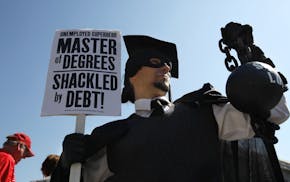One of the nuttier ideas making its way around Washington calls for enacting a temporary tax "holiday" for U.S. companies that have an estimated $1 trillion in profits squirreled away at foreign subsidiaries.
Bringing that money home, we are told, would stimulate new investment and development that could create up to 2 million more jobs for Americans.
Don't believe it.
We tried this once before and were left with little to show for it. When Congress passed the American Jobs Creation Act (AJCA) of 2004, lowering the tax on foreign profits from 35 to 5.25 percent, U.S. firms with overseas operations recognized it for what it was: an incredible gift at the expense of the federal treasury.
3M, for example, brought back $1.7 billion, while St. Jude Medical's foreign subsidiaries sent $500 million back to Little Canada. In total, U.S. companies repatriated an estimated $362 billion. Hewlett-Packard alone returned $14.5 billion.
Subsequent studies have shown that much of the money was used to finance stock buybacks or boost dividend payouts, not build factories or hire workers. The nonpartisan Congressional Research Service reports that most of the largest beneficiaries of the holiday actually cut jobs in 2005-2006.
Even worse, studies by Northwestern University Prof. Thomas Brennan and others suggest that the tax holiday actually encouraged companies to stockpile even more money abroad in anticipation of cashing in on an even grander scale from a future tax holiday.
"From this perspective, it seems the AJCA may have been a net failure in achieving the policy goal of returning foreign earnings to the United States," Brennan wrote in a 2010 study.
Given that so many companies now do business around the world, it would be naive to think that all of the profits earned at foreign subsidiaries can and should end up back in the United States.
Pentair, the water treatment company based in Golden Valley, got 28 percent of its pretax income from international operations in 2010 and has about $224 million designated as "indefinitely invested" in its foreign subsidiaries.
The company recently agreed to pay $705 million for a Dutch water filtration company that does business in China, Latin America and the Middle East. Inevitably, some of the profits earned abroad will be plowed back into those offshore businesses.
Still, the fact that companies were so quick to take advantage of the tax holiday the last time around suggests that they are sheltering more of their profits abroad than they would otherwise prefer.
Companies are sensitive to the perception that decisions about factory locations or other investments may be overly influenced by lower tax and wage rates in other parts of the world. Pentair and St. Jude, for example, both declined to make anyone available to discuss their stance on a tax holiday.
But publicly traded companies are required to tell shareholders how much profit they've invested in their foreign operations. It appears in the footnotes of the annual report, usually in the income taxes section. St. Jude, for example, has about $1.8 billion, while 3M is up to $5.6 billion.
Companies are free to bring that money back to the U.S. anytime. Doing so triggers a 35 percent tax, though foreign tax credits can reduce that rate. In the fourth quarter of 2010, Imation, a technology firm based in Oakdale, took a $5.1 million charge after it borrowed money from some of its foreign subsidiaries.
The proponents of a tax holiday have one thing right: Something's wrong if your tax code encourages companies to stash an increasing proportion of their profits abroad. And in this case, the problem is our statutory corporate income tax rate of 35 percent. That's higher than Mexico and all of Europe, where the average rate is 25 percent.
This disparity puts the U.S. at a sharp competitive disadvantage when it comes to attracting foreign firms looking to expand. A 35 percent tax rate also distorts the behavior of domestic companies, which are always looking for creative ways to reduce their tax liability. Lobbying for a vast array of special exemptions and credits is one way to lower that burden; shifting operations abroad is another.
Any serious discussion about jump-starting economic growth in the U.S. should include an overhaul of the corporate tax code. Any revenue lost by lowering the rate -- 25 percent would be a good starting point -- could be recovered by closing loopholes and phasing out credits. Lower rates could stimulate more investment in the United States, both by domestic and international firms. Best of all, the benefits of lower rates would be shared far and wide, not just by companies with large multinational operations.
The problem with a tax holiday is that it mistakes activity for progress.
ericw@startribune.com • 612-673-1736

Wieffering: Time to get over debit card fees
For Thrivent and others, warnings were there

With billions in sales, some co-ops are big business

